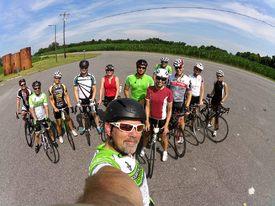Always FREEZING
Options
Replies
-
I don't know the answer and I haven't lost a lot of weight yet but I always get the shivers after running more than about 9 miles. It doesn't matter if it is summer or winter. After a long run I try to drink hot liquids and cover up.
If someone has an answer for this I would be interested to know.
This is from the Livestrong website...
Running packs a remarkable number of benefits into a wonderfully simple package. It helps you lose or maintain weight, boosts your cardiovascular health, lowers your stress levels and tones your legs. However, you don't get something for nothing, and the rigors of the activity can manifest it in a host of ways. Shakiness after a workout is one sign of possibly having overworked yourself.
Hypoglycemia
One of the cardinal signs of hypoglycemia, defined by the University of Iowa as a blood-glucose level below 60 mg/dl, is shaking; others include sweating, confusion, nausea, headache and blurred vision. Diabetics are far more prone than others to this condition after a workout, and if you are one of the millions of North Americans with diabetes you need to be sure not to take too much insulin or eat too little before your run.
Low Thyroid & Normal Labs Suffer With Symptoms of Low Thyroid But Labs Are 'Normal'? Discover Why CarolinasThyroidInstitute.com
Sponsored Links Glycogen Depletion
If you're among the hundreds of thousands of runners training for a marathon, you most likely do one run a week that is considerably longer in distance and duration than the others. This being the case, the unusual stress puts you at risk of glycogen depletion, or "hitting the wall." If this happens, your muscles will have been fatigued to their limit and you're likely to experience some post-run shaking. MayoClinic.com recommends eating a large meal several hours before your run and small snacks in the hour before you head out to reduce the chances of hitting the wall.
Hills
Running uphill is not only harder in terms of the demands on your heart and lungs, but it's also considerably harder on your leg muscles, especially if you do repeats up a moderate to steep incline. Your calf and gluteal muscles contract more forcefully, and your quadriceps have to rise higher with each stride than they do on flat ground so that your feet can land in the right spot on the hill. With every muscle group having been maximally taxed, you may experience post-run leg shakiness.
Too-fast Start
If you're new to running or are returning after a long layoff, one of the biggest challenges you face is doing not too little but too much. Running faster than you're ready to comfortably run, farther than your body's ready to carry you or both may quickly lead to problems such as injury or illness. If you're lucky, all that will happen is that legs that aren't used to the stresses of distance running will shake for a few minutes after a run. Ease off the pace or scale back the distance of your runs by 25 percent if you experience post-run shakiness.
Read more: http://www.livestrong.com/article/472677-shaking-after-running/#ixzz1ghTiagJ30 -
Thyroid was tested in the spring and was fine... So maybe it's just that layer of soft, insulating blubber... will ask the doctor anyhow... see if she thinks so too.
Yes, I had a thyroid function test which came out fine too. It's just living with a calorie deficit. Once you up your calories it won't be so bad, but I've lost 2 1/2 stone of insulatory fat, so that's got to have some effect!0
Categories
- All Categories
- 1.4M Health, Wellness and Goals
- 392K Introduce Yourself
- 43.6K Getting Started
- 259.8K Health and Weight Loss
- 175.7K Food and Nutrition
- 47.4K Recipes
- 232.3K Fitness and Exercise
- 402 Sleep, Mindfulness and Overall Wellness
- 6.4K Goal: Maintaining Weight
- 8.5K Goal: Gaining Weight and Body Building
- 152.8K Motivation and Support
- 7.9K Challenges
- 1.3K Debate Club
- 96.3K Chit-Chat
- 2.5K Fun and Games
- 3.4K MyFitnessPal Information
- 23 News and Announcements
- 998 Feature Suggestions and Ideas
- 2.4K MyFitnessPal Tech Support Questions

